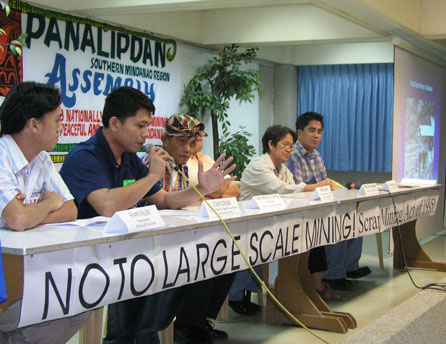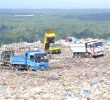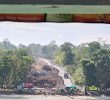By Grace S. Uddin
DAVAO CITY (davaotoday.com) � It�s easy to get mesmerized by the glitter of a gold ring. But there�s a story behind its allure.
It takes the excavation of 20 tons of soil to produce such a ring. Imagine for a second the toll such a process exacts. Destroyed land. Felled trees. Stripped mountains.
In the context of the Philippine countryside, include these: Displaced communities, dispossessed families, violence, even death.
Such is the havoc large-scale mining has wrought in many communities in the Philippine countryside, anti-mining activists said last week.

�In making one gold ring, 20 tons of land will have to be excavated,� said Datu Monico Cayog, a Lumad and one of the convenors of Panalipdan, an alliance of environmenet groups and people�s organizations that is opposing to large-scale mining. �This is a great threat to us,� he said.
Cayog was speaking at a forum last week organized by Panalipdan-Southern Mindanao Defenders and Advocates for Environment, Creation and Patrimony at the San Pedro College auditorium. In that forum, he spoke of how large and multinational mining companies dislocated Lumad families from their homes and how they brought in the military to crush resistance to mining projects.
�When there is mining activity led by big companies, there is always the military to drive the Lumads away,� he said.
Large-scale mining, he said, profoundly affects their environment, leaving them stripped, literally, of their livelihood.
The plight of the Lumads and other communities affected by large-scale mining has forced groups such as Panalipdan to intensify their campaign against large-scale mining and for the repeal of the Mining Act, which allows foreign mining companies to operate. These companies, they said, have often created considerable damage to the environment and have little to show by way of repairing this damage or indemnifying displaced villagers.
But Panalipdan clarified that its members were not against mining per se. What they are opposing, the group said, are large, foreign mining companies and their �destructive practices.�
Panalipdan has come up with a �People�s Mining Policy� as an alternative. The concept paper they presented last week said that �to achieve genuine development, the mineral industry should be nationalized.�
�Genuine national industrialization is premised on the (a) accumulation and reinvestment of capital within the country against profit repatriation by corporations, (b) control over the utilization of available natural resources, (c) harnessing of benefits from modern technology for the country�s own technological advancement founded on the strong aspects of local knowledge systems, (d) job generation and human resources upgrading.�
Meanwhile, small-scale miners in the Davao regions, who are supporting this policy, have called for the repeal of the Philippine Mining Act of 1995.
�The small-scale miners will also be affected as this law grants foreign mining firms the right to conduct mining activities and for them to own as much as 100% of the country�s natural resources,� said Louie Ceniza, a leader of a small-scale miners groups from Compostela Valley province. �Consequently,� he added, �we will be driven away from where we make our living.�
Ceniza and the others also denounced the law that gives a five-year tax holiday to these foreign mining companies. �It�s very clear that this government favors the interest of foreign capitalists rather than its own constituents,� he said.
�The Arroyo government is gradually and brutally killing us with its subservient policies that favor foreign capitalists while reneging on its responsibility to help small-scale miners,� said Erwin Faller, Panalipdan�s spokesman.
Compostela Valley and the rest of the Southern Mindanao region host many large mining companies, several of them foreign-owned.
The government has been working to put the entire Diwalwal gold-rush area, perhaps the most contentious mining area in the country today, under its control. Small-scale miners in the area, however, said that the government will displace them and allow large companies to take over, thus depriving them of livelihood.
The Catholic Bishops Conference of the Philippines had also called for the repeal of the Mining Act because, according to the bishop, it threatens the environment.
The government has said that it was only promoting �responsible mining,� requiring mining companies, for instance, to allot 10 percent of their gross income for programs to protect the environment.
Mining companies, meanwhile, have repeatedly rebutted these assertions by critics. They maintain that mining creates wealth for everybody, makes lives better in communities.
The country�s mineral wealth is estimated at $840 billion, one of the largest in the world. �It�s a total shame not to take advantage of the blessings,� Benjamin Philip Romualdez, president of the Chamber of Mines of the Philippines, said last month after the CBCP made known its anti-mining position.
The military has explained their presence in these mining areas by saying that soldiers protect these companies from groups such as the communist New People�s Army.
Panalipdan was convened by these groups: Sisters Association for Mindanao, Promotion of Church People�s Response, Sagip, Pasaka Lumad Confederation in Southern Mindanao, Manat Quasi Parish-Nabunturan, Mainit National Park Conservation Society, Impede-Davao Oriental, Masipag, Kalitawhan-Biodiversity, Misfi, Children�s Rehabilitation Center, Kadumahan, Rural Missionaries of the Philippines, Center for Overseas Workers, the Religious of the Good Shepherd, and Legal Resource Center. (Grace S. Uddin/davaotoday.com)
Indigenous Peoples








